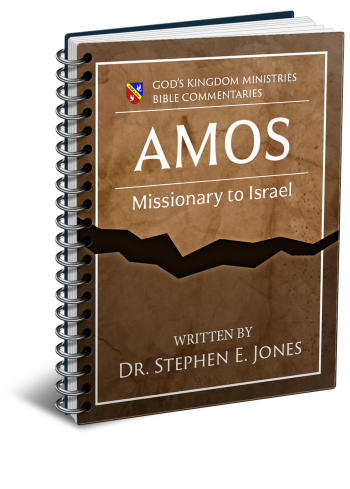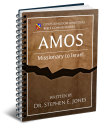Latest Posts
View the latest posts in an easy-to-read list format, with filtering options.

Amos was a missionary from Judah to Israel, giving them a final warning to repent before divine judgment was to destroy the nation. They refused, and two years later the nation was struck by a massive earthquake that destroyed their defenses and allowed the Assyrians to conquer them easily.
Category - Bible Commentaries

Amos 4:1 says,
1 Hear this word, you cows of Bashan, who are on the mountain of Samaria, who oppress the poor, who crush the needy, who say to your husbands [adon, “rulers,”], “Bring now, that we may drink!”
The NASB translators thought that Amos was referring to women who had taken authority over their husbands. It is implied that the wives in Samaria told their husbands to bring them some wine to drink. But there is no support for this, apart from the obscure verse above. Adon means a ruler, master, or lord, but the usual word for “husband” is ish, as in Gen. 3:6, and occasionally baal, as in Exodus 21:3. As far as I can tell, Amos 4:1 is the only place where the NASB renders adon as “husbands.”
The Septuagint translators of the Old Testament used the Greek word kurios, “lord, or master” as the equivalent of the Hebrew word adon, and the English translation reads, “masters.”
The metaphor, then, is of cows telling their masters to bring them water to drink, so that they do not have to walk all the way to the river. It has nothing to do with wives telling their husbands to fetch them a drink of wine, water, or any other drink.
The metaphor, of course, is as ridiculous as the clay telling the potter how to do his job (Isaiah 45:9), or a newly-begotten son asking his father, “What are you begetting?” (Isaiah 45:10), or a newborn questioning his mother, “To what are you giving birth” (Isaiah 45:10).
Paul himself says in Romans 9:20,
20 On the contrary, who are you, O man, who answers back to God? The thing molded will not say to the molder, “Why did you make me like this,” will it?
We should interpret Amos 4:1 in the same light. Cows have no right to tell the herdsmen to fetch them water when the river is just down the hill. But Israel (both men and women) had acted like cows of Bashan taking charge of the pasture and enslaving the poor herdsmen. They had defied God by oppressing the poor and crushing the needy,
The divine verdict, says Amos 4:2, 3, is this:
2 The Lord God has sworn by His holiness, “Behold, the days are coming upon you when they will take you away with meat hooks [tsinna, “thorn, barb, hook”], and the last of you with fish hooks. 3 You will go out through the breaches in the walls, each one straight before her, and you will be cast to Harmon,” declares the Lord.
What do you do with rebellious cows? They are the first to be led away with hooks in their jaws. Again, the NASB translation of tsinna is questionable. “Meat hooks” paint a picture of those cows being the first to be butchered and hung up by meat hooks to be cut into steaks and roasts.
Amos, however, was more likely talking about the old practice of putting a hook into the jaw of a cow, so that it might be more easily led according to the will of the owner. For example, see Ezekiel 29:4, where God says, “I will put hooks in thy jaws.”
Amos was telling rebellious Israel that God would soon take them away like cattle with hooks in their jaws. They were to be led into captivity by the Assyrians, going out of the city “through the breaches in the walls” in a straight line. Such scenes were common after successful sieges.
At the end of verse 3, Amos says, “and you will be cast to Harmon.” Harmon seems to be a place name, but the place is unknown at the present time. The name means “fortress, palace,” but some also think that it is a reference to Armenia, whose territory then was part of the Assyrian empire. Some of the captive Israelites were settled there.
Amos 4:4, 5 says,
4 “Enter Bethel and transgress. In Gilgal multiply transgression! Bring your sacrifices every morning, your tithes every three days [yom]. 5 Offer a thank offering also from that which is leavened, and proclaim freewill offerings, make them known. For so you love to do, you sons of Israel,” declares the Lord God.
Amos was showing disdain for the sacrifices being made at Bethel and Gilgal. Sacrifices were of no value as long as the people remained rebellious and disobedient to God. It is quite strange how so many people can be so sincerely religious, while at the same time having no respect for the laws and commands of God.
So Amos speaks ironically, telling Israel to come to church (Bethel, the “house of God”) and transgress the law of God, which is sin (1 John 3:4). “Keep doing what you are doing!” he says. “Don’t stop bringing your sacrifices and tithes, and the priests will allow you to sin to your heart’s content.”
The “tithes every three days” probably referring to the three-year tithe in Deut. 14:28,
28 At the end of every third year [shaneh], you shall bring out all the tithe of your produce in that year, and shall deposit it in your town.
Moses used the word shaneh, which means “year.” But Amos used the word yom, which normally means “day.” Even so, yom is also translated “year” fourteen times in the KJV. So we read in Psalm 90:4, “For a thousand years [yom] in Thy sight are like yesterday.” Peter refers to this verse, saying in 2 Peter 3:8,
8 But do not let this one fact escape your notice, beloved, that with the Lord one day is as a thousand years, and a thousand years as one day.
Peter understood that yom could mean either a day or a year—or even a thousand years. The word had a broad range of meaning. Hence, it seems more likely that when Amos used the term, he was referring to the third-year tithe, since a three-day tithe was unknown.
Amos 4:5 tells Israel (ironically) to offer a leavened offering as well, something that was forbidden in the law. Lev. 2:11 says,
11 No grain offering, which you bring to the Lord, shall be made with leaven, for you shall not offer up in smoke any leaven or any honey as an offering by fire to the Lord.
Leaven literally means “corruption,” a reference to fermentation. It was seen as a type of sin or corrupt teaching. So Jesus told his disciples to watch out for such leaven. Matt. 16:6 says,
6 And Jesus said to them, “Watch out and beware of the leaven of the Pharisees and Sadducees.”
The disciples at first did not understand what Jesus meant, so Jesus explained it to them. Matt. 16:11, 12 says,
11 “How is it that you do not understand that I did not speak to you concerning bread? But beware of the leaven of the Pharisees and Sadducees.” 12 Then they understood that He did not say to beware of the leaven of bread, but of the teachings of the Pharisees and Sadducees.
The Pharisees and Sadducees taught the people to obey their interpretations of the law, which are known as the “traditions of men.” In Matt. 15:7-9 Jesus quoted from Isaiah 29:13, saying,
7 You hypocrites, rightly did Isaiah prophesy of you, saying, 8 “This people honors Me with their lips, but their heart is far away from Me. 9 But in vain do they worship Me, teaching as doctrines the precepts [or “traditions,” KJV] of men.”
These precepts or traditions are soulish interpretations of the word of God that had been accepted by men for a long time, but which were wrong nonetheless. By contrast, Jesus and all the prophets taught the law by spiritual revelation. The Holy Spirit must reveal the word to us in order to walk in truth. The contrasts between the two are seen most clearly in Jesus’ “Sermon on the Mount.”